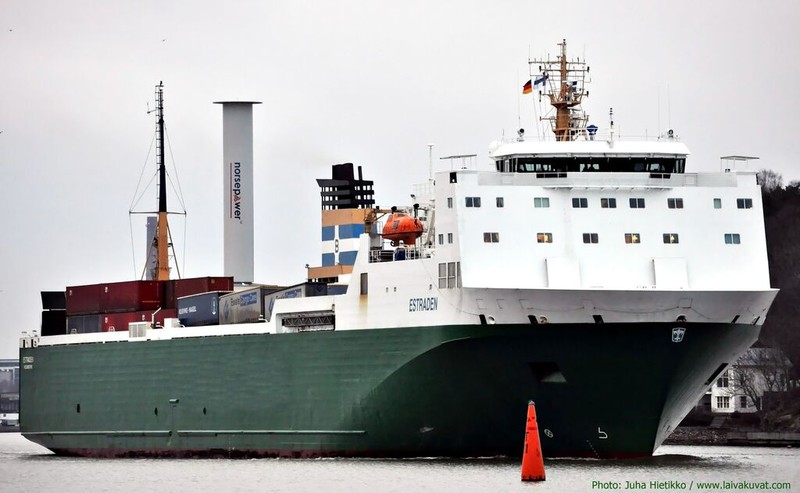Monday, 09/02/2026 | 12:06 GMT+7
Norsepower Oy and Bore say the sea trial of Norsepower’s Rotor Sail — a new wind propulsion technology for ships — verified by NAPA and supported by VTT Technical Research Centre of Finland, confirm fuel savings of 2.6 percent using a single small Rotor Sail on a route in the North Sea. With these fuel savings, the technology has a payback period of 4 years, the companies say.
Based on the trials, Norsepower and Bore believe that a full system on Estraden with two rotors has the potential to deliver 5 percent efficiency savings on an ongoing basis. Norsepower forecasts savings of 20 percent for vessels with multiple, large rotors traveling in favorable wind routes.
The Norsepower Rotor Sail Solution was installed on the 9,700 DWT Ro-Ro carrier MS Estraden. Owned by Bore, a Finnish Ro-Ro Shipping Company, MS Estraden operates in a continuous service between the Netherlands and the UK, sailing through the North Sea’s windy corridors at speeds of 16 knots.

The Norsepower Rotor Sail Solution is a modernized version of the Flettner rotor, a spinning cylinder that uses the Magnus effect to harness wind power to propel a ship. When the wind conditions are favorable, Norsepower Rotor Sails allow the main engines to be throttled back, saving fuel and reducing emissions while providing the power needed to maintain speed and voyage time.
Rotor sails can be used with new vessels or can be retrofitted on existing ships without off-hire costs. The installation was completed in two parts: the required foundations were installed during a normal dry-dock stay, followed by the 18-metre-high rotor during an ordinary seven-hour harbor stay.
Norsepower is one of several technology companies participating in a joint program of Carbon War Room and UCL Energy Institute to fast-track adoption of emerging wind-propulsion technologies by the shipping industry.
Leading banks in the shipping industry, including HSH Nordbank and KfW IPEX-Bank, use energy-efficiency data in making investment and financing decisions, according to an April survey by Carbon War Room.
Truong Duy








 Energy Efficiency and Conservation: Technology as the “Key”
Energy Efficiency and Conservation: Technology as the “Key”
 Consultation on the methodology for developing and updating energy consumption standards for four major industrial sectors
Consultation on the methodology for developing and updating energy consumption standards for four major industrial sectors
 Opening of the 2025 Energy-Efficient Equipment and Green Transition Exhibition Fair
Opening of the 2025 Energy-Efficient Equipment and Green Transition Exhibition Fair
 Energy-saving solutions and green transition promotion
Energy-saving solutions and green transition promotion
 The 9th VEPG Steering Committee Meeting: Strengthening Coordination for Viet Nam’s Just Energy Transition
The 9th VEPG Steering Committee Meeting: Strengthening Coordination for Viet Nam’s Just Energy Transition